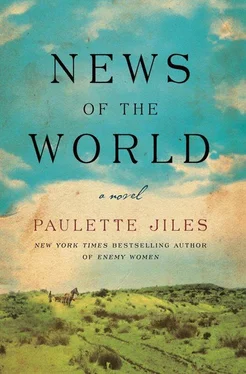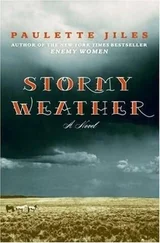Why don’t you read from the Houston Tri-Weekly Union, sir?
Another man rose to his feet. Because that’s a damned Davis paper, and they are every one of them damned unreconstructed thieves!
They are Republicans! Loyal to the Union to a man!
Another man yelled, And so what then? They have become indoctrinated by professional agitators!
Gentlemen! Captain Kidd shouted.
A grudging silence and the three men standing sat down slowly and glared at one another.
He did not have very long. He read quickly, flipping newsprint, read of far places and frozen climes, of reports of revolution in Chile, trying to bring them distant magic that was not only marvelous but true. He read of riots in the Punjab re: census taking, female privacy; all the spilling images of a rumored world weighted with railroads and modernity coming up against ancient tribal hatreds.
The tulip—he read quickly—long under guard in Turkey for years—bulbs confiscated from diplomatic pouches—now superseded in value by the Angora goat from the region of Ankara—Pashas object—Angoras smuggled aboard the Highland Star . . .
Davis will shut down the Dallas Courier under the Printing Bill! a little blond man screamed. Two hundred thousand dollars of tax money to hand out to radical newspapers!
Two men got to their feet and came face-to-face shouting about the turncoat Hamilton and the corrupt Davis, others tried to separate them but they were intent on doing each other damage and the people separating them, each with a bottom lip stuck out and bent backward trying to avoid blows, became involved in the passions expressed. Women seized their skirts in both hands and got out of the building and several picked up their husbands’ or fathers’ or brothers’ handguns from the bench outside and carried them away. The U.S. Army sergeant listened for a moment to the shouts about military rule and Austin corruption and the Printing Bill and stayed where he was.
Finally it came to fists and chairs and the rainstorm came merrily on as one of the glass cases splintered. The coin can was turned over and men trod on the money. The hanging kerosene lanterns swung back and forth and people trampled the chairs down and shook the walls. One man broke a good Wedgwood commemorative plate over another’s head. A short man pulled off his belt and began laying about him with the buckle. At the end, the two major combatants, who were the owner of the hotel and the schoolteacher, a young man with spiky, ill-cut hair and pale cheeks inflamed with acne but a determined fighter, struck and twisted themselves out of the door and into the street.
All the rest followed.
CAPTAIN KIDD REMAINED for a few moments at the lectern. He put his chin on his fist and surveyed the wreckage. Then he folded his newspapers and put them in the portfolio and let out a long breath. It was much better up on the Red River, he decided, where all you really had to deal with was the Comanche, the Kiowa, and sometimes the U.S. Army.
And up there in North Texas, of course, was Mrs. Gannet.
He walked through the overturned chairs and saw all the silver coins flung about on the floorboards, glinting like eyes. It was humiliating but he would have to grovel on his hands and knees and pick them all up. He would not have done it had it not been for Johanna. He would have said, You blustering loudmouthed jackasses can have them and he would have walked away.
The Army sergeant at the door was gone. Fat raindrops spattered out on the dirt street. Men were out there still shouting at one another with the intermittent voices of peacemakers crying Listen, listen now . . . The Captain knelt down and began collecting the coins.
Here, sir, you shouldn’t have to do that.
It was the man with the short black beard who had stopped him on the road.
No, I shouldn’t, said Captain Kidd. But here I am doing it.
The man drew up an unbroken chair for him and indicated it with a sweep of the hand. The Captain sat down gratefully, his hip joints aflame, and the man began to pick up all the coins himself.
My name is John Calley, the man said. He poured coins back into the can out of his large, callused hand. He said, We should not have taken your money this morning on the road. I am regretting it.
The Captain nodded and pressed his fingertips against his eyes. He said, You have fallen in with bad company.
That would be my cousins and my brother.
Still.
Well, yes.
Captain Kidd thought about the apparent ages of the man’s companions, cousins and brother, and said, They were in the war.
So was I.
Ah, said Kidd. You were young.
No sir, I was seventeen.
That’s young.
The Captain had forgotten he himself had seen his sixteenth birthday at the Battle of Horseshoe Bend, firing at the Red Sticks with a rifled Kentucky long bore. He watched the coins drop into the paint can, one after another.
He said, You should abandon your wayward relatives and decline their illegal activities.
No telling what’s illegal these days. John Calley stepped forward to the shelves of suspenders and the collar buttons on cards. He was now dressed in pressed dark trousers and a cutaway, a snowy white shirt with a high collar and a cravat. It was all somewhat frayed but clean. His dark beard was shorter, neatly trimmed. He wore good boots, the Captain saw, with a pair of arm-and-hand spurs. Calley peered at the shelf and said, Well, be damned, there’s one up here. He picked the ten-cent piece up in his thick fingers, delicately. Then he said, Of course I should. But things change week to week. He poured the money out of his fist into the can. The legal situation is very unstable. Land titles, everything.
The Captain realized that John Calley had come in his best clothes to show the Captain that he was not, indeed, a filthy ignorant brigand but a man gently reared. A serious man. That he wanted the Captain’s respect.
The Captain cleaned his glasses slowly on his handkerchief. You are not thinking of reading law, are you? he said.
Oh God no! John Calley stood holding the paint can. I am looking for honest work.
That’s an improvement, then, from when I first came upon you.
Granted. Calley flushed a bit at the cheekbones. And so if one were to read law, where is there solid ground? Somewhere there has to be a bedrock of the law.
Captain Kidd said, It has been said by authorities that the law should apply the same to the king and to the peasant both, it should be written out and placed in the city square for all to see, it should be written simply and in the language of the common people, lest the people grow weary of their burdens.
The young man tipped his head toward the Captain with an odd look on his face. It was a kind of longing, a kind of hope.
Who said that?
Hammurabi.
CAPTAIN KIDD KNEW the best thing would be to leave immediately, in the night, as they had done before. Same situation as Dallas. He had collected his fees for the reading but yet none of the establishments of Durand were open and if he were to pound on the door of J. D. Allan, Prop., to ask to purchase .38 ammunition it would become known and the general condition of suspicion would have it that he was on his way to shoot someone of the opposite party, whatever party that was. He had eight bullets left for the revolver, and the dove shot and several pounds of gunpowder and a supply of dimes. That would have to do.
From the banks of the Bosque, by the dim light of the candle lantern, he collected Pasha and Fancy. The rain had lessened but still it dripped from his hat brim and his silk topper had become heavy with it and sat on his head in a damp chunk. He slogged through the wet grass calling to the horses in a low voice. Little Fancy seemed to delight in her musical bell and lifted her head and jingled it. The horses were rested and full of new spring grass. He led them in. Inside the stave mill he changed to his old traveling clothes by the light of the lantern. He wondered how many candles they had left. The silence and the lacy patterns that the candle threw out of the intricately pierced tin shade were comforting. He ate a quick meal of black beans and bacon.
Читать дальше












